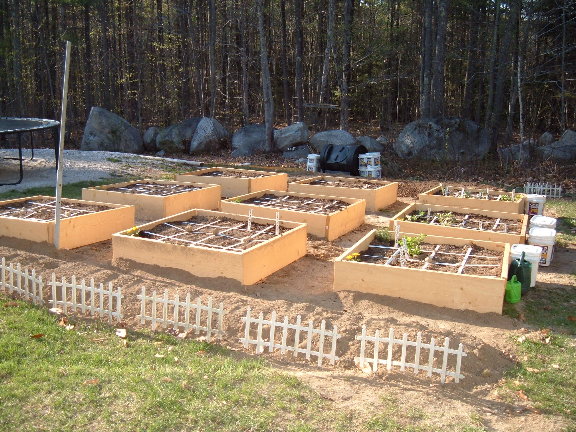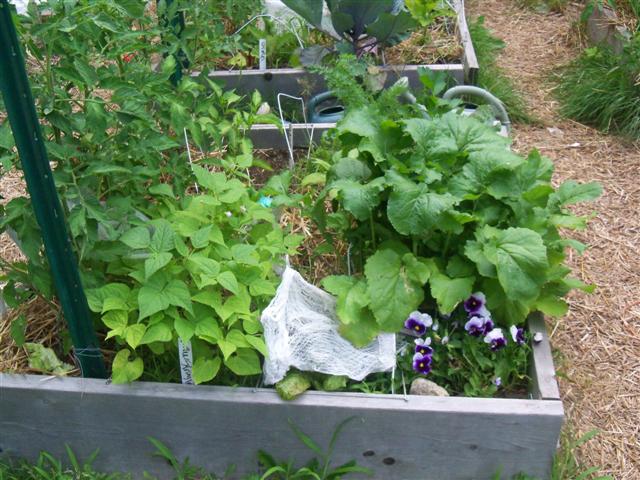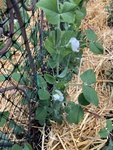Search
Latest topics
» It's only me.by MrBooker Today at 9:52 am
» Need Garden Layout Feedback
by BassetMom3 Yesterday at 7:25 am
» Hello from Marshall County, Alabama
by Scorpio Rising 2/3/2025, 10:16 pm
» Bokashi
by OhioGardener 2/3/2025, 2:41 pm
» There is Fungus Among Us
by OhioGardener 2/3/2025, 2:35 pm
» Famous Gardening Quotes
by OhioGardener 2/2/2025, 2:21 pm
» Hello from San Antonio,Tx
by Scorpio Rising 2/1/2025, 5:52 pm
» Recycling newspaper => starter pots
by OhioGardener 2/1/2025, 8:10 am
» Ohio Gardener's Greenhouse
by OhioGardener 1/29/2025, 10:43 am
» Grass fed versus organic meat
by DorothyG 1/28/2025, 11:55 pm
» Coast of Maine Soil Products
by donnainzone5 1/28/2025, 4:21 pm
» Starbucks for coffee grounds!
by OhioGardener 1/28/2025, 3:44 pm
» National Seed Swap Day - January 30th
by OhioGardener 1/27/2025, 9:41 am
» N&C Midwest—January/February 2025!
by OhioGardener 1/26/2025, 6:22 pm
» U.S. Last & First Frost Dates - Planting Schedules
by OhioGardener 1/26/2025, 1:43 pm
» Can't Top These Tiny Taters!
by Scorpio Rising 1/25/2025, 3:31 pm
» Happy Birthday!!
by Scorpio Rising 1/25/2025, 11:32 am
» Mark's first SFG
by sanderson 1/24/2025, 2:06 pm
» What Have You Picked From Your Garden Today
by OhioGardener 1/23/2025, 4:20 pm
» NEW 4th Edition of All New Square Foot Gardening available for Pre-Order
by sanderson 1/23/2025, 2:19 pm
» Seed starter box from milk container
by sanderson 1/23/2025, 2:04 pm
» When Can I Start My Seeds?
by OhioGardener 1/20/2025, 11:15 am
» What are you eating from your garden today?
by OhioGardener 1/17/2025, 6:19 pm
» Fresh Bites Red F1 Sweet Pepper
by OhioGardener 1/11/2025, 7:24 am
» Favorite Seed Companies?
by middlemamma 1/9/2025, 11:25 pm
» Earthworm Castings Increase Germination Rate and Seedling Development of Cucumber
by Scorpio Rising 1/6/2025, 10:29 pm
» Holy snow Batman!
by Scorpio Rising 1/6/2025, 10:27 pm
» Ideas for increase health
by has55 1/5/2025, 8:16 am
» Compost from the Box Stores
by has55 1/5/2025, 5:03 am
» Kiwi's SFG Adventure
by KiwiSFGnewbie 1/5/2025, 2:57 am
Google
rasied garden bordering question?
+8
Furbalsmom
ashort
Chopper
sfg4uKim
quiltbea
boffer
llama momma
bears4x4
12 posters
Page 1 of 1
 rasied garden bordering question?
rasied garden bordering question?
I know the sfg book recommends using non treated lumber for the edging but i have looked around and have seen many people using treated lumber or even treated railroad ties- even at the local schools. How likely or has there been tests done to see if the chemicals in the wood actually leach into the food grown there in. Just a question i have been asking my self for the past few weeks.

bears4x4-
 Posts : 15
Posts : 15
Join date : 2012-01-02
Location : katy texas
 Re: rasied garden bordering question?
Re: rasied garden bordering question?
I am not aware of any tests. It makes good sense to me though to stay far away from treated wood. Some people line the beds with plastic and are comfortable with that. I have three beds with untreated wood, no plastic liner, hardware cloth underneath. I am comfortable with whatever time frame the beds last and consider replacement at some point all part of the grand scheme.

llama momma
Certified SFG Instructor-
 Posts : 4914
Posts : 4914
Join date : 2010-08-20
Location : Central Ohio zone 6a
 Re: rasied garden bordering question?
Re: rasied garden bordering question?
I found a study that said if I ate two CCA pressure treated 2x4x8's every day for 10 years that my body would accumulate enough arsenic to kill me.
Insiders in the know say that the discontinuation of CCA products was about money and marketshare, and not dangers to the end users.
What is the truth? Don't look for it on gardening websites and forums. Look for it in the real boring, hard to understand, testing results presented by universities, extension services, and independent labs. Use that data to make your decisions.
I'm in the small minority on the forum: all my boxes are pressure treated; less than half are lined with plastic.
Insiders in the know say that the discontinuation of CCA products was about money and marketshare, and not dangers to the end users.
What is the truth? Don't look for it on gardening websites and forums. Look for it in the real boring, hard to understand, testing results presented by universities, extension services, and independent labs. Use that data to make your decisions.
I'm in the small minority on the forum: all my boxes are pressure treated; less than half are lined with plastic.
 Re: rasied garden bordering question?
Re: rasied garden bordering question?
I had to hunt a lot before I found untreated wood and that was in a lumber yard, not at Lowe's or Home Depot which only had treated wood. It wasn't cedar which would last a lot longer but I feel safer with untreated so bought spruce. I'm an organic grower so it makes sense to me to use untreated. Here's my first 9 beds in spring 2009.

This is their 4th year and they are in great shape after winters buried completely in snow. They are 2" X 12" boards.
I figure when they start falling apart it'll be time for me to replace them, fewer beds probably, with cinder blocks on which I can seat my old posterior while I'm planting. For this endeavor, I'm buying 2 or 3 at a time (cinder blocks) and setting them aside so they'll be ready when the untreated wood finally fails.
Our health is threatened from all sorts of directions so reducing one of them by using only untreated wood, makes sense to me.

This is their 4th year and they are in great shape after winters buried completely in snow. They are 2" X 12" boards.
I figure when they start falling apart it'll be time for me to replace them, fewer beds probably, with cinder blocks on which I can seat my old posterior while I'm planting. For this endeavor, I'm buying 2 or 3 at a time (cinder blocks) and setting them aside so they'll be ready when the untreated wood finally fails.
Our health is threatened from all sorts of directions so reducing one of them by using only untreated wood, makes sense to me.

quiltbea-
 Posts : 4707
Posts : 4707
Join date : 2010-03-21
Age : 82
Location : Southwestern Maine Zone 5A
 Re: rasied garden bordering question?
Re: rasied garden bordering question?
Thanks for the replys. I just have some treated boards lying around , was thinking of using them but I'll just buy a few untreated ones.

bears4x4-
 Posts : 15
Posts : 15
Join date : 2012-01-02
Location : katy texas
 Re: rasied garden bordering question?
Re: rasied garden bordering question?
Penn State Study
I have seen women looking at jewelry ads with a misty eye and one hand resting on the heart, and I only know what they're feeling because that's how I read the seed catalogs in January - Barbara Kingsolver - Animal, Vegetable, Miracle
sfg4u.com
FB: Square Foot Gardening 4 U

FB: Square Foot Gardening 4 U
 Re: rasied garden bordering question?
Re: rasied garden bordering question?
[quote="quiltbea"

This is their 4th year and they are in great shape after winters buried completely in snow. They are 2" X 12" boards.
.[/quote]
Wow, if that is how they look after four Maine winters and summers then I am impressed!

This is their 4th year and they are in great shape after winters buried completely in snow. They are 2" X 12" boards.
.[/quote]
Wow, if that is how they look after four Maine winters and summers then I am impressed!
 Re: rasied garden bordering question?
Re: rasied garden bordering question?
sfg4uKim wrote:Penn State Study
Maybe you could offer a conclusion?
 Re: rasied garden bordering question?
Re: rasied garden bordering question?
Last page of the report:
WHAT CAN BE DONE TO REDUCE THE RISKS OF
GARDEN USES OF CCA-TREATED WOOD?
Although the plant and human health risks from garden
uses of CCA-treated lumber appear to be extremely small,
there are steps gardeners can take to further reduce any such
risks.
Use alternative materials. Any possible risks from exposure
of plants or humans to CCA metals can be eliminated
by not using CCA-treated wood in vegetable garden applications.
Alternative materials include:
• Naturally decay-resistant wood such as eastern or western
red cedar, northern white cedar, Osage orange, white
oak, locust, or redwood (none of these will last as long as
CCA-treated wood, however).
• Plastic lumber, concrete blocks, brick, or stone; wire
mesh for compost bins.
• Wood treated with ACQ (alkaline copper quaternary
ammonium). This is an alternative wood-treatment
chemical that contains no arsenic, chromium, or any
other chemical considered toxic by the EPA. However,
ACQ contains more copper than CCA, and some copper
will leach from ACQ-treated lumber as it does from
CCA-treated lumber.
If you choose to use CCA-treated wood for gardening
purposes, do not allow sawdust or wood scraps to fall
onto garden beds and do not put CCA sawdust in your
compost pile.
Cover CCA-treated wood used for raised garden beds
or borders with heavy plastic to prevent contact with
garden soil.
Manage your garden soil to reduce plant availability
of As, Cr, and Cu.
• Maintain soil pH in the near-neutral range (pH 6–7).
Solubility of Cr and Cu is greatly reduced in neutral
soils.
• Maintain adequate phosphorus fertility levels. Plant
uptake of As is reduced by the presence of phosphorus.
• Maintain high soil organic matter levels by adding compost
or manure. Organic matter strongly binds As, Cr,
and Cu and thus reduces their availability to plants.
Plant vegetables, especially root crops, at least 12 inches
from CCA-treated wood. Concentrations of CCA metals
will be highest in soil immediately adjacent to the wood.
If plants are some distance from the CCA-treated wood,
most of the root systems will be in soil with normal As, Cr,
or Cu levels.
Thoroughly wash all soil from vegetables grown in
close proximity to CCA-treated wood. In general, soil will
have much larger concentrations of CCA metals than will
plant tissues. Thus, human intake of CCA metals can be reduced
by removing all soil from vegetables immediately
after harvest.
Peel root crops grown in close proximity to CCAtreated
wood. Plant tissue concentrations of CCA metals
will be highest in roots, especially at the root surface. Thus,
peeling root crops such as carrots, potatoes, and turnips
will remove much of any As, Cr, or Cu that the plant may
have taken up.
WHAT CAN BE DONE TO REDUCE THE RISKS OF
GARDEN USES OF CCA-TREATED WOOD?
Although the plant and human health risks from garden
uses of CCA-treated lumber appear to be extremely small,
there are steps gardeners can take to further reduce any such
risks.
Use alternative materials. Any possible risks from exposure
of plants or humans to CCA metals can be eliminated
by not using CCA-treated wood in vegetable garden applications.
Alternative materials include:
• Naturally decay-resistant wood such as eastern or western
red cedar, northern white cedar, Osage orange, white
oak, locust, or redwood (none of these will last as long as
CCA-treated wood, however).
• Plastic lumber, concrete blocks, brick, or stone; wire
mesh for compost bins.
• Wood treated with ACQ (alkaline copper quaternary
ammonium). This is an alternative wood-treatment
chemical that contains no arsenic, chromium, or any
other chemical considered toxic by the EPA. However,
ACQ contains more copper than CCA, and some copper
will leach from ACQ-treated lumber as it does from
CCA-treated lumber.
If you choose to use CCA-treated wood for gardening
purposes, do not allow sawdust or wood scraps to fall
onto garden beds and do not put CCA sawdust in your
compost pile.
Cover CCA-treated wood used for raised garden beds
or borders with heavy plastic to prevent contact with
garden soil.
Manage your garden soil to reduce plant availability
of As, Cr, and Cu.
• Maintain soil pH in the near-neutral range (pH 6–7).
Solubility of Cr and Cu is greatly reduced in neutral
soils.
• Maintain adequate phosphorus fertility levels. Plant
uptake of As is reduced by the presence of phosphorus.
• Maintain high soil organic matter levels by adding compost
or manure. Organic matter strongly binds As, Cr,
and Cu and thus reduces their availability to plants.
Plant vegetables, especially root crops, at least 12 inches
from CCA-treated wood. Concentrations of CCA metals
will be highest in soil immediately adjacent to the wood.
If plants are some distance from the CCA-treated wood,
most of the root systems will be in soil with normal As, Cr,
or Cu levels.
Thoroughly wash all soil from vegetables grown in
close proximity to CCA-treated wood. In general, soil will
have much larger concentrations of CCA metals than will
plant tissues. Thus, human intake of CCA metals can be reduced
by removing all soil from vegetables immediately
after harvest.
Peel root crops grown in close proximity to CCAtreated
wood. Plant tissue concentrations of CCA metals
will be highest in roots, especially at the root surface. Thus,
peeling root crops such as carrots, potatoes, and turnips
will remove much of any As, Cr, or Cu that the plant may
have taken up.

ashort-
 Posts : 518
Posts : 518
Join date : 2011-02-17
Age : 56
Location : Frisco, TX zone 8a
 Re: rasied garden bordering question?
Re: rasied garden bordering question?
Yea its not worth the risk to my family and much easier to just do a garden bed with untreated lumber. Wow but thank you, this was very informational.

bears4x4-
 Posts : 15
Posts : 15
Join date : 2012-01-02
Location : katy texas
 Re: rasied garden bordering question?
Re: rasied garden bordering question?
Yep, wasn't being an "alarmist" and just put out the ENTIRE report without comment so people could draw their own conclusions. 
Personally I don't want to HAVE to peel my root crops.
Personally I don't want to HAVE to peel my root crops.
I have seen women looking at jewelry ads with a misty eye and one hand resting on the heart, and I only know what they're feeling because that's how I read the seed catalogs in January - Barbara Kingsolver - Animal, Vegetable, Miracle
sfg4u.com
FB: Square Foot Gardening 4 U

FB: Square Foot Gardening 4 U
 Re: rasied garden bordering question?
Re: rasied garden bordering question?
Chopper.....Sorry, but if you read my post again, you'll see that above the photo I mentioned these were the new beds 4 years ago. The lumber was fresh and new and still yellow.
THIS is how they looked this past summer now that the lumber has aged (3 yrs) but they are still solid all the way to the ground. I expect they'll last me a few more years.

THIS is how they looked this past summer now that the lumber has aged (3 yrs) but they are still solid all the way to the ground. I expect they'll last me a few more years.


quiltbea-
 Posts : 4707
Posts : 4707
Join date : 2010-03-21
Age : 82
Location : Southwestern Maine Zone 5A
 Re: rasied garden bordering question?
Re: rasied garden bordering question?
The boxes have weathered nicely QB
I did use a latex paint (actually recycled paint that was a mix of mutilple left over colors of latex paints) on the outside of my table tops to get a uniform look to them, but I can see, after just one year, the paint is failing. I did not put anything on the inside of my boxes because I did not want paint to be in contact with my MM.
I did use a latex paint (actually recycled paint that was a mix of mutilple left over colors of latex paints) on the outside of my table tops to get a uniform look to them, but I can see, after just one year, the paint is failing. I did not put anything on the inside of my boxes because I did not want paint to be in contact with my MM.

Furbalsmom-
 Posts : 3138
Posts : 3138
Join date : 2010-06-10
Age : 78
Location : Coastal Oregon, Zone 9a, Heat Zone 2 :(
 Guidance on Treated Lumber from New Jersey Dept Ag
Guidance on Treated Lumber from New Jersey Dept Ag
Guidance on Treated Lumber for Producers
New Jersey Department of Agriculture
Organic Certification Program
http://www.nj.gov/agriculture/divisions/md/pdf/treatedlumber.pdf
New Jersey Department of Agriculture
Organic Certification Program
http://www.nj.gov/agriculture/divisions/md/pdf/treatedlumber.pdf

tomperrin-
 Posts : 350
Posts : 350
Join date : 2011-03-20
Age : 82
Location : Burlington, NJ Zone 7a (2012 version), in the hollow, surrounded by trees.
 Re: rasied garden bordering question?
Re: rasied garden bordering question?
I doing my new boxes in stone.... limestone specifically...

ashort-
 Posts : 518
Posts : 518
Join date : 2011-02-17
Age : 56
Location : Frisco, TX zone 8a
 Re: rasied garden bordering question?
Re: rasied garden bordering question?
What do you guys think about PVC board?
http://www.lowes.com/pd_238345-99899-2827_4294934154__?productId=3603698&Ntt=pvc+trim&pl=1¤tURL=%2Fpl_Lumber_4294934154__s%3FNtt%3Dpvc%2Btrim&facetInfo=
Or Vinyl Fence Rail
http://www.lowes.com/pd_87348-73428-73061401S_0__?productId=3362766&Ntt=vinyl+fence+rail&pl=1¤tURL=%2Fpl__0__s%3FNtt%3Dvinyl%2Bfence%2Brail&facetInfo=
http://www.lowes.com/pd_238345-99899-2827_4294934154__?productId=3603698&Ntt=pvc+trim&pl=1¤tURL=%2Fpl_Lumber_4294934154__s%3FNtt%3Dpvc%2Btrim&facetInfo=
Or Vinyl Fence Rail
http://www.lowes.com/pd_87348-73428-73061401S_0__?productId=3362766&Ntt=vinyl+fence+rail&pl=1¤tURL=%2Fpl__0__s%3FNtt%3Dvinyl%2Bfence%2Brail&facetInfo=

ralitaco-
 Posts : 1303
Posts : 1303
Join date : 2010-04-04
Location : Southport , NC
 Re: rasied garden bordering question?
Re: rasied garden bordering question?
kelly1 wrote:I read that limestone will leach, and change the pH.
Thanks, I'll have to watch for that. If it is a problem, then I can solve it pretty easily...

ashort-
 Posts : 518
Posts : 518
Join date : 2011-02-17
Age : 56
Location : Frisco, TX zone 8a
 PVC & Vinyl Boards
PVC & Vinyl Boards
Color me prejudiced against anything plastic.
My first observation is that neither boards are really wide enough, due to the fact that they are adhering to milled lumber specs. My results using that size Trex were disappointing. Mel's Mix settled, and my end result was too little dirt for anything but lettuce and spinach. If you must use this stuff, I would suggest the 8" boards. It might also be appropriate for a tropical or rainforest climate. Other than that, they might be nice for flower beds out front of the house. I also like the idea of limestone bricks. Nothing wrong with limestone leachate unless you're growing azaleas or rhododendrons or other acid loving plants.
I also suggest price comparisons between milled 2" x 8" x 8' pine if cedar is not available. It's relatively cheap, very sturdy, and should last almost indefinitely in an arid climate, and a long time even in our more humid areas. When it does break down in the garden, it just adds to the humus content of the mix.
We've been too enamored of plastics in the kitchen for decades. We're now shifting to inert glass containers or plastic that does not break down rapidly. Same thing in the garden. We're shifting to plain, unpainted, untreated cedar squares as fast as I can build them. I've got some scrap 2" x 8" that I may convert to squares just to see how long it takes them to rot in our climate.
My first observation is that neither boards are really wide enough, due to the fact that they are adhering to milled lumber specs. My results using that size Trex were disappointing. Mel's Mix settled, and my end result was too little dirt for anything but lettuce and spinach. If you must use this stuff, I would suggest the 8" boards. It might also be appropriate for a tropical or rainforest climate. Other than that, they might be nice for flower beds out front of the house. I also like the idea of limestone bricks. Nothing wrong with limestone leachate unless you're growing azaleas or rhododendrons or other acid loving plants.
I also suggest price comparisons between milled 2" x 8" x 8' pine if cedar is not available. It's relatively cheap, very sturdy, and should last almost indefinitely in an arid climate, and a long time even in our more humid areas. When it does break down in the garden, it just adds to the humus content of the mix.
We've been too enamored of plastics in the kitchen for decades. We're now shifting to inert glass containers or plastic that does not break down rapidly. Same thing in the garden. We're shifting to plain, unpainted, untreated cedar squares as fast as I can build them. I've got some scrap 2" x 8" that I may convert to squares just to see how long it takes them to rot in our climate.

tomperrin-
 Posts : 350
Posts : 350
Join date : 2011-03-20
Age : 82
Location : Burlington, NJ Zone 7a (2012 version), in the hollow, surrounded by trees.
 Re: rasied garden bordering question?
Re: rasied garden bordering question?
You can get a 2" x 10" x 8' pine board at Home Depot for $5.47. They will make one cut for free. So, to make a 4' x 4' x 10" high box costs $10.94 before tax. Very cheap. Won't last as long as cedar but it's hard to get cedar where I live. Pine is everywhere.

yolos-
 Posts : 4139
Posts : 4139
Join date : 2011-11-20
Age : 75
Location : Brooks, Ga Zone 7B/8A
 Re: rasied garden bordering question?
Re: rasied garden bordering question?
[quote="boffer"]I found a study that said if I ate two CCA pressure treated 2x4x8's every day for 10 years that my body would accumulate enough arsenic to kill me.
I think you'd be a goner in about 3 days from splinter overload
just couldn't resist.....
I think you'd be a goner in about 3 days from splinter overload
just couldn't resist.....

llama momma
Certified SFG Instructor-
 Posts : 4914
Posts : 4914
Join date : 2010-08-20
Location : Central Ohio zone 6a
 Re: rasied garden bordering question?
Re: rasied garden bordering question?
@ralitaco I had some left over PVC sign board scraps that I used for some beds. I am not a plastic fan either, but I didn't really want to put them in a dumpster either. There has been PVC pipe in my house's system for 30 years. I haven't heard any problems with PVC. just my 2 cents.

Squat_Johnson-
 Posts : 440
Posts : 440
Join date : 2010-05-25
Location : Beaver Dam, Kentucky, zone 6a
 Re: rasied garden bordering question?
Re: rasied garden bordering question?
Squat_Johnson wrote:There has been PVC pipe in my house's system for 30 years. I haven't heard any problems with PVC.
great point

ralitaco-
 Posts : 1303
Posts : 1303
Join date : 2010-04-04
Location : Southport , NC
 Similar topics
Similar topics» any one from northern mn or zone 3 bordering 4?
» Lady Bug Brand Rasied Bed Mix - Anyone have experience with it (Austin, TX based company)
» Table top garden question
» Question for those who companion garden.
» Garden Soil question
» Lady Bug Brand Rasied Bed Mix - Anyone have experience with it (Austin, TX based company)
» Table top garden question
» Question for those who companion garden.
» Garden Soil question
Page 1 of 1
Permissions in this forum:
You cannot reply to topics in this forum








